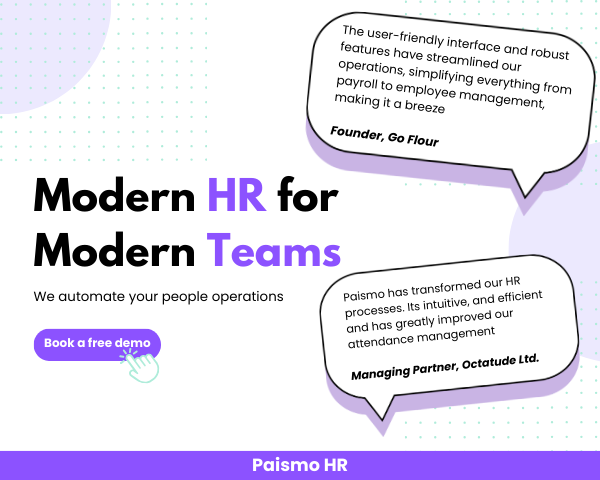Highlights
- Professionalism in HR shapes trust, fair treatment, and smooth teamwork across the organization.
- Core HR values include clear communication, consistency, and using innovative tools to support people and policies.
- Skills like decision-making, time management, and collaboration help HR professionals adapt and lead.
- HR professionals face daily challenges like staying neutral, managing priorities, and updating old systems.
- Building professionalism starts with accountability, innovative tools, and open feedback to support a strong work culture.
Managing people goes beyond hiring and day-to-day tasks; it requires earning trust, addressing issues fairly, and setting the right example across the workplace. That’s why professionalism in HR holds such value. It directly affects how policies are carried out, how employees feel, and how smoothly teams work together.
As companies continue to grow and adapt to modern workplace needs, the role of HR professionals is becoming even more vital. In this article, we’ll explore how professionalism in HR impacts company culture, why it matters more than ever, and what it means for long-term organizational success.
What is Professional in HR?
Professionalism in HR means handling people and processes with care, fairness, and respect. It includes how HR teams communicate, solve problems, and support employee and company goals. Being professional helps build trust, create clear policies, and make the workplace more organized and positive.
As workplaces evolve, being professional also means using the right tools to stay efficient and consistent. Many teams now rely on systems like HRMS to organize employee records, manage attendance, and track performance. With the help of HR software for professional use, HR teams can work more smoothly, reduce manual errors, and focus on building a supportive, well-run environment.
What Are the Core Elements of HR Professionalism?
Professionalism in HR is more than just following policies about applying them fairly, clearly supporting employees, and helping the business run smoothly. A professional HR approach means handling sensitive matters with care, making consistent decisions, and earning the trust of both staff and leadership. This balance allows HR to shape a respectful and productive workplace.
Here are the key elements that shape true HR professionalism:
- Respect each team member equally and handle confidential matters with sensitivity and care.
- Speak openly and sincerely to create trust and encourage better organizational teamwork.
- Apply workplace rules and policies consistently to promote transparency and avoid favoritism.
- Using tools like HR software in Pakistan to simplify processes and ensure accuracy in HR tasks.
- Relying on HR professional services to ensure compliance and stay updated on best practices.
Together, these practices help HR teams create a supportive work environment, improve decision-making, and build long-term confidence across the company.
What Are the Top HR Skills Every Professional Needs Today?
In today’s fast-moving work culture, HR professionals play a more strategic role than ever. From shaping employee experience to ensuring compliance, the right skills help HR teams build trust and improve results. With growing startups and hybrid teams, platforms like Paismo support modern HR with practical, people-first tools.
- Effective Communication Skills
HR professionals must communicate policies, feedback, and updates clearly with all levels of staff. Strong listening, writing, and speaking skills help avoid misunderstandings and build lasting trust.
- Decision-Making with Data
HR professionals today must use data to guide hiring, retention, and engagement strategies. Using insights instead of guesswork leads to more thoughtful, faster decisions that support business growth.
- Policy and Compliance Awareness
Modern HR must stay aligned with evolving rules, including privacy policy standards and labor laws. This ensures fair treatment of employees while protecting the company from legal risks.
- Time Management and Prioritization
Balancing daily tasks like hiring, training, and resolving issues requires strong time-planning skills. Good time management keeps HR teams productive, especially in fast-paced startups.
- Team Collaboration and Flexibility
Collaboration is a daily need, whether working across departments or supporting managers. An HR professional's day often involves juggling multiple relationships with care.
- Creative Problem-Solving
HR issues aren’t always black and white; conflicts, retention, and morale need thoughtful handling. Being solution-focused helps resolve challenges while keeping teams engaged and stable.
- Strategic Thinking and Planning
HR must align people strategy with business goals to support long-term growth and stability. Understanding the big picture helps HR lead better workforce planning and change management.
These skills help HR professionals stay ahead, support employee success, and maintain an organized and people-first environment.
What Are Some of the Biggest Challenges That HR Professionals Face?
In many workplaces, HR professionals face constant pressure to manage tasks that range from hiring to handling sensitive employee issues. One of their biggest day-to-day challenges is staying neutral during conflict. Since they speak for the company and its people, being fair and calm in challenging situations is essential for building trust and moving things forward.
At the same time, organizing priorities can be difficult with many responsibilities, recruitment, paperwork, and employee concerns; it’s easy to feel pulled in different directions. This becomes more challenging when HR has to update old systems or rethink how certain things are done. Even small changes require clear thinking and patience.
Moreover, keeping up with new rules, tools, and employee expectations takes regular effort. Without learning and adapting, HR teams can fall behind. These kinds of tasks often define a day in the life of an HR professional, balancing short-term needs with long-term growth while staying grounded and practical.
Practical Tips for Implementing Professionalism in HR
Bringing professionalism into HR isn’t just about policies; it’s about setting the right tone through daily actions. Here are a few simple and effective ways to make it happen:
- Encourage Accountability
Start by setting a standard where HR professionals take ownership of their work. When mistakes happen, the focus should be on learning and improving. This approach builds trust and shows responsibility at all levels.
- Use Smart HR Tools
Reliable systems like HR software help teams reduce manual work and increase accuracy. These tools allow HR to focus more on people and less on paperwork when used well.
- Promote Continuous Learning
Professionalism grows with knowledge. Offer regular chances for your HR team to attend workshops, follow updates in labor laws, or explore modern HR strategies. Even short training can lead to significant improvements.
- Set Clear Conduct Standards
Make sure everyone knows what’s expected in terms of workplace behavior. Whether it’s a written policy or regular reminders, clear rules help avoid confusion and support fairness.
- Welcome Honest Feedback
Create ways for employees to share their views on HR practices. This will help improve processes and show that their voice matters, an essential step in building a respectful work culture.
Summary
Professionalism in HR is more than ticking boxes or enforcing rules; it’s about creating a workplace that runs with trust, clarity, and consistency. When your team knows what to expect, it’s easier to solve problems, support growth, and keep things moving in the right direction. With the right systems and daily habits, HR becomes a steady force behind a better work culture and long-term success.
FAQs
How Should HR Professionals Handle Harassment in the Workplace?
HR should respond quickly, stay neutral, and follow set policies. They must protect privacy and ensure a fair process. The goal is to resolve the issue and maintain trust.
What Roles Should HR Professionals Play in Staffing Decisions?
HR helps define roles, shortlist candidates, and guide hiring steps. They ensure fair, legal, and unbiased decisions. This supports smart hiring and long-term team success.
Become a part of the Paismo community
Paismo is an HR software that can help simplify your HR operations. In today's dynamic economic environment, efficient HR and automated payroll management are no longer a luxury but a necessity. Paismo is a comprehensive solution that transforms traditional HR complexes into streamlined and automated workflows. Paismo and its paired biometric device integration can be used for your business to mark employee attendance and record their timesheets accurately.
Paismo simplifies your tasks with its core HRMS, timesheets, and attendance management, as well as biometric attendance, payroll automation, and leave management system.
Take the first step toward modernizing your HR and payroll processes and explore what Paismo can do for you. Book a demo with our sales team.









